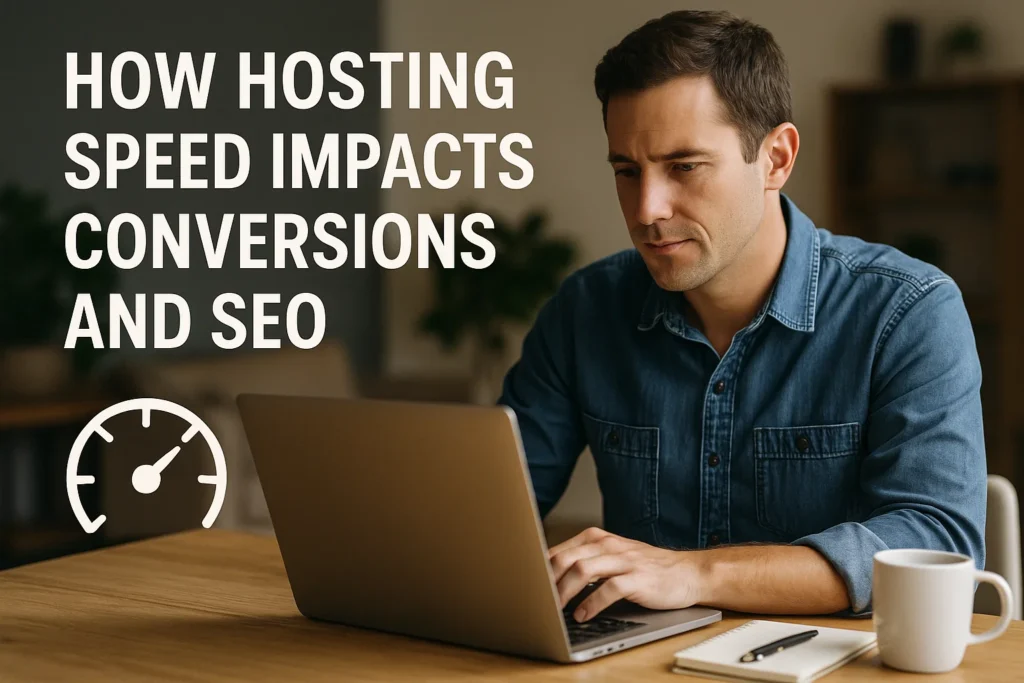In today’s digital landscape, where user attention spans are shorter than ever, website speed has become one of the most critical factors in determining online success. While businesses often focus on web design, content, or marketing strategies, the role of hosting speed is sometimes underestimated.
The truth is, the speed of your hosting provider directly impacts not only the user experience but also your search engine rankings and conversion rates. When someone visits your website, the first few seconds are crucial. If the site loads quickly, users are more likely to stay, explore, and potentially convert into customers.
On the other hand, a slow-loading site drives visitors away, damages credibility, and reduces search visibility. In this article, we’ll explore in depth how hosting speed affects conversions and SEO, why it should be a top priority for businesses, and how you can optimize it to maximize growth in 2025 and beyond.
Why Website Speed Matters in the Digital Age
Website speed is no longer just a technical detail—it is a central pillar of online performance. Users expect instant gratification, and even a one-second delay can lead to noticeable drops in engagement. Studies consistently show that faster-loading websites achieve higher satisfaction rates, lower bounce rates, and better overall performance in terms of conversions.
Moreover, search engines like Google have made page speed a ranking factor. This means that even the best content can underperform if hosted on a slow server. In an age of fierce competition, every fraction of a second matters. Businesses that invest in fast hosting gain a clear edge over competitors who overlook this critical element.
Understanding Hosting Speed
Hosting speed refers to how quickly a hosting server responds to a user’s request when they attempt to access your website. It includes several components, such as server response time, bandwidth availability, caching efficiency, and geographical server distribution.
When a user clicks on your website, the hosting server processes that request, retrieves the necessary files, and delivers them to the browser. If the hosting server is slow, the entire process is delayed, leading to sluggish load times. Hosting speed is therefore not just about raw server power but also about how well-optimized the hosting infrastructure is for modern demands.
Key factors influencing hosting speed include:
- Server location: The closer the server is to the user, the faster the data transfer.
- Hardware quality: High-performance SSDs and CPUs process requests more efficiently.
- Bandwidth: Determines how much data can be transmitted at once.
- Caching mechanisms: Reduce the need to reload data repeatedly.
- Server software optimization: Ensures efficient handling of multiple requests.
A combination of these factors determines whether your website feels seamless or sluggish to users.
Hosting Speed and Conversions: The Direct Link
Conversions—the moment when a user takes the desired action on your website, whether making a purchase, signing up for a newsletter, or filling out a form—are deeply tied to hosting speed. Slow websites create friction, while fast ones enable smooth journeys that encourage conversions.
First Impressions Count
When a potential customer lands on your site, the loading time shapes their first impression. A fast website signals professionalism and reliability, while delays create doubt about the business’s credibility. In many industries, this first impression determines whether a user stays or clicks away.
Bounce Rates and Abandonment
Statistics reveal that websites taking longer than three seconds to load face high bounce rates. Users simply don’t wait. For e-commerce stores, every additional second of delay increases cart abandonment rates. A slow checkout process can devastate revenue, as customers choose faster competitors.
Customer Trust and Loyalty
Speed is also tied to trust. A consistently fast website builds customer confidence, encouraging repeat visits and long-term loyalty. On the other hand, even loyal customers may drift away if a site becomes slow and frustrating.
Mobile Experience
With the majority of online traffic now coming from mobile devices, hosting speed is even more critical. Mobile users often rely on slower connections, making fast hosting essential for delivering a seamless experience on the go.
The direct correlation between speed and conversions is undeniable: the faster the site, the higher the likelihood of turning visitors into customers.
Hosting Speed and SEO: The Hidden Power
Search Engine Optimization (SEO) is all about improving visibility in search engines, and hosting speed plays a pivotal role in this process. Google and other search engines prioritize websites that deliver strong user experiences, and speed is central to this evaluation.
Google’s Core Web Vitals
In 2021, Google introduced Core Web Vitals as a key ranking factor, emphasizing three aspects:
- Largest Contentful Paint (LCP): Measures loading performance.
- First Input Delay (FID): Tracks interactivity.
- Cumulative Layout Shift (CLS): Evaluates visual stability.
Hosting speed directly influences LCP and FID, meaning a slow host can drag down your Core Web Vitals scores and, ultimately, your rankings.
Crawl Budget and Indexing
Search engines use a crawl budget to determine how often and how deeply they scan your website. Slow-loading servers consume more crawl budget, limiting how much of your site gets indexed. This can hurt visibility, especially for websites with large volumes of content.
User Engagement Signals
Google also considers engagement signals like bounce rates, time on site, and click-throughs. A fast-loading website keeps users engaged, sending positive signals to search engines. Conversely, high abandonment due to speed issues suggests poor user experience, lowering SEO rankings.
Local SEO and Mobile-First Indexing
With mobile-first indexing in place, hosting speed becomes even more critical. Sites that don’t perform well on mobile devices are at a clear disadvantage. Additionally, server location and speed can influence local SEO, as Google prioritizes results that load efficiently in specific geographic regions.
Thus, hosting speed is not just a technical factor—it is a key player in shaping search visibility.
Case Studies: Speed vs. Success
To understand the real-world impact of hosting speed, consider these examples:
- Amazon once reported that a one-second slowdown could cost them billions in annual revenue, highlighting how every second counts in e-commerce.
- Google found that reducing page load time by just 0.4 seconds increased search traffic and engagement significantly.
- Walmart reported a 2% increase in conversions for every one-second improvement in page speed.
These examples make it clear that hosting speed is not just a technical concern—it’s a business-critical factor.
How to Improve Hosting Speed
Now that we’ve established the importance of hosting speed, the next question is: how can businesses improve it? Here are some strategies:
Choose the Right Hosting Plan
Shared hosting is often cheap but can be slow due to resource sharing. Upgrading to VPS (Virtual Private Server), dedicated hosting, or cloud hosting provides faster performance and scalability.
Optimize Server Location
Select a hosting provider with servers close to your target audience. Content Delivery Networks (CDNs) further reduce latency by distributing content across global servers.
Invest in Modern Hardware
Ensure your hosting provider uses SSD storage, powerful CPUs, and high-performance infrastructure.
Enable Caching and Compression
Caching reduces repeated data loading, while compression tools like Gzip minimize file sizes, leading to faster load times.
Regular Monitoring
Use tools like Google PageSpeed Insights, GTmetrix, or Pingdom to monitor website performance and identify areas for improvement.
By implementing these strategies, businesses can significantly enhance hosting speed and enjoy better conversions and SEO results.
Hosting Speed in 2025: The Future of Optimization
Looking ahead, hosting speed will become even more vital as websites grow more complex and user expectations rise. Key trends include:
- Edge Computing: Bringing servers closer to users for near-instant data delivery.
- AI-Powered Optimization: Using machine learning to predict and pre-load user requests.
- Sustainable Hosting: Balancing speed with eco-friendly energy solutions.
- 5G Integration: Taking advantage of faster mobile connections while ensuring servers can match the pace.
Businesses that stay ahead of these trends will enjoy stronger competitiveness and better online growth.
Final Thoughts
Hosting speed is one of the most powerful yet underappreciated factors shaping website success. It influences how users perceive your brand, how long they stay on your site, whether they convert, and where you rank on search engines. A fast, reliable hosting solution is no longer optional—it is essential for thriving in the digital age.
By understanding the direct connection between hosting speed, conversions, and SEO, businesses can make smarter investments in their online infrastructure. The result is a smoother user experience, stronger search visibility, and ultimately, higher revenue. In the battle for online attention, speed isn’t just an advantage—it’s the foundation of success.

